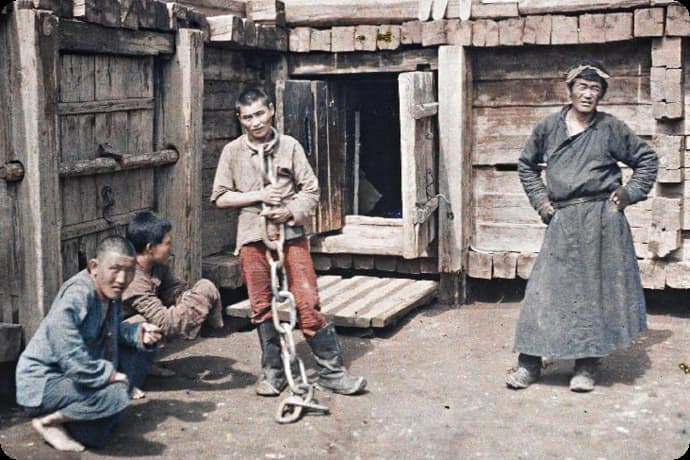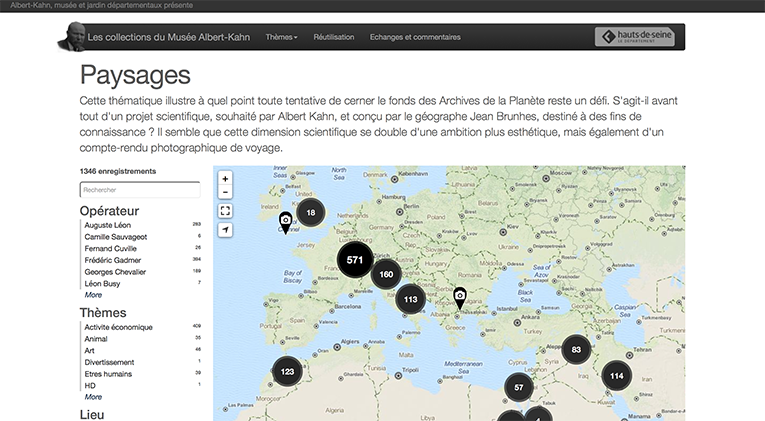The Archives of the Planet by Albert Kahn, Now Available in Open Data
The opening of this exceptional collection has been made possible by using the Hauts-de-Seine Open Data portal (available in French), powered by Opendatasoft.

According to Albert Kahn, the purpose of the Archives of the Planet is to account for “the aspects and the practices of human activity which will inevitably disappear over time”. This large iconographic collection consists of 72,000 Autochrome plates (color photographs on glass plates) and hundreds of hours worth of black and white films.
This is the result of the work of photographers recruited by Albert Kahn and sent all around the world. Between 1909 and 1931, the photographers have been to more than fifty countries to record the everyday lives of the inhabitants of the planet.The iconographic stock of the Archives of the Planet is currently kept at the Musée Albert-Kahn in Boulogne-Billancourt, near Paris. Going off of its policy of opening up cultural data, the French department Hauts-de-Seine has chosen to share this unique collection in open data.This follows a 10-year campaign of scanning and documenting led by the Musée Albert-Kahn. The opening of this exceptional collection has been made possible by using the Hauts-de-Seine Open Data portal (available in French), powered by Opendatasoft.
The Archives of the Planet are Available on the Hauts-de-Seine Open Data Portal
The iconographic stock is available in the form of a dataset available on the portal “Open Data Haut-de-Seine”. This portal has all the Opendatasoft features to share and bring value to the data. Thanks to the image gallery, it is quick and easy to explore the available Autochromes.
Browse through the images above. The Opendatasoft platform enables a user to embed the image gallery on third party websites.
Because the collection is geo-located, it is also possible to access the images on a map.
With the Opendatasoft platform interactive maps such as the one above can be embedded on websites.
On the portal, the filters allow users to easily sort the data displayed on the map and in the image gallery. Moreover, as with all portals using the Opendatasoft platform, the APIs facilitate the reuse of data.
Improving Data Distribution with Opendatasoft Widgets
Not only available on the portal “Open Data Hauts-de-Seine”, the Archives of the Planet collection is directly accessible from a dedicated website (available in French).
On the website, the Autochromes are organized into themes. Opendatasoft widgets are used to display interactive visualizations of the Autochromes related to each theme. You can then access the images in different ways: map, image gallery, filters. Using Opendatasoft widgets, it was possible to freely organize the presentation of the data (here, images) within the page of the website. The content of the website provides additional information about the displayed data.

The website dedicated to Albert Kahn’s Archives of the Planet uses Opendatasoft widgets.
Opendatasoft widgets provide a flexible and easy-to-set-up structure to present data in an interactive way within a website.
By using its existing Opendatasoft platform, the Hauts-de-Seine department was able to share the Archives of the Planet collection easily and without additional costs. Almost 9,000 images are already available and 70,000 images will be online by the end of the year. Those pictures are a precious record of the human activities at the 20th century. They are available for the first time outside the Musée Albert-Kahn for free.
Learn more about the Archives of the Planet by visiting the website dedicated to the collection (available in French).
Credits: Camp, Inner Mongolia, China, July 18, 1912. Autochrome from Stéphane Passet, inv. A 763. Musée Albert-Kahn – Hauts-de-Seine Department.



